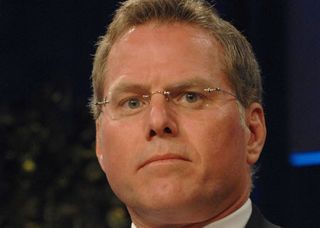David Zaslav Hits the Motherlode

Discovery Communications CEO David Zaslav has vaulted into the lead among the top-paid CEOs in the media industry, reaping total compensation of $156.1 million in 2014, according to a proxy statement filed with the Securities and Exchange Commission Friday night (April 3).
Zaslav’s compensation is about five times the $33.3 million he received in 2013 and is heavily loaded with one-time awards, part of a new six-year employment pact he signed with the company in January, which keeps him in the CEO seat through the end of the decade.
It is expected that Zaslav’s total compensation will return to normal levels in 2015.
Zaslav received $3 million in base salary, $6.1 million in non-equity incentives and $1.9 million in other compensation, according to the proxy, all in line with what he received in the prior year. Where Zaslav hit pay dirt was in stock compensation -- $94.6 million in stock awards (up from $0 in 2013) and $50.5 million in option awards (more than double the $22.5 million he received in the prior year).
The deal makes Zaslav the highest paid U.S. media executive so far, in the early days of the proxy season. So far about five companies in the space have filed their proxy statements – with Walt Disney Co. chairman and CEO Bob Iger nabbing $46.5 million in total compensation in fiscal 2014; Viacom CEO Philippe Dauman netting $44.3 million in total pay in fiscal 2014; Charter Communications CEO Tom Rutledge earning $16.1 million; and Scripps Networks chairman and CEO Ken Lowe receiving $11.8 million. Twenty-First Century Fox, whose fiscal year ends in June, paid chairman Rupert Murdoch $29.2 million in 2014.
Yet to file are Comcast, Time Warner Cable and several other large -media companies, which are expected to submit their proxy statements in the coming weeks.
While Zaslav’s compensation puts him at the top of the all-time list among media executives so far – the previous champ was Liberty Media CEO Greg Maffei, who received $87.5 million in 2009 and $102.5 million as CEO of two companies (Liberty Media and Liberty Interactive) in 2012 – it can be a little misleading. Like those other two executives, Zaslav take was heavily front-loaded with option awards – many of which are currently under water – that he is prohibited from cashing in until after his employment agreement expires at the end of the decade. So, it’s not like Discovery cut the CEO a $156.1 million check in 2014.
Multichannel Newsletter
The smarter way to stay on top of the multichannel video marketplace. Sign up below.
And while his 2014 compensation should have some CEO pay experts scratching their heads, it doesn’t even approach the level that some top CEOs in other industries have reached. For example, in 2011 Apple CEO Tim Cook received $378 million in total compensation (mostly in stock options and awards). Last month, it was revealed that Blackstone Group CEO Stephen Schwartzman took home $690 million in total compensation in 2014.
Although critics may pan the sheer size of Zaslav’s award, the Discovery CEO has brought tremendous value to the company. Discovery’s market capitalization has quadrupled since 2007 from $5 billion to $20 billion, according to the proxy statement. At the same time, the home of Discovery Channel, TLC, Animal Planet, Investigation Discovery, Science and others, has grown its global portfolio of networks from reaching 280 million cumulative worldwide subscribers in 2008 to 2.6 billion. At the same time, despite a decline of about 27% in its stock price in 2014, Discovery shares have risen nearly five-fold since 2007 from $7.19 per share to $32.15 each on April 2.
Discovery’s revenue has nearly doubled from $3.4 billion in 2008 to $6.3 billion in 2014 and cash flow has nearly tripled from $1.3 billion to $3.4 billion in the same period.
Zaslav’s employment deal, which expires on Dec. 31, 2019, puts the CEO on a path to ownership of the company, according to the proxy. Last year, major Discovery shareholder John Malone inked a deal that would give Zaslav the right of first refusal for Malone’s Discovery shares in the event the Liberty Media chairman decides to sell. Malone currently owns about 28.7% of Discovery’s voting shares. Not including the Malone agreement, Zaslav stands to own about 1% of Discovery’s outstanding stock (or about 1.5 million shares) at the end of his employment agreement.
“The board’s goal is to move David to ownership ranks,” a Discovery spokesman said. “By doing this one-time grant that he has to hold to term and tying his performance to the growth of the stock, it really does lock him down and aligns him with shareholders. If shareholders do well, David will do well and having his services for the long term really is in the best interests of the company.”
